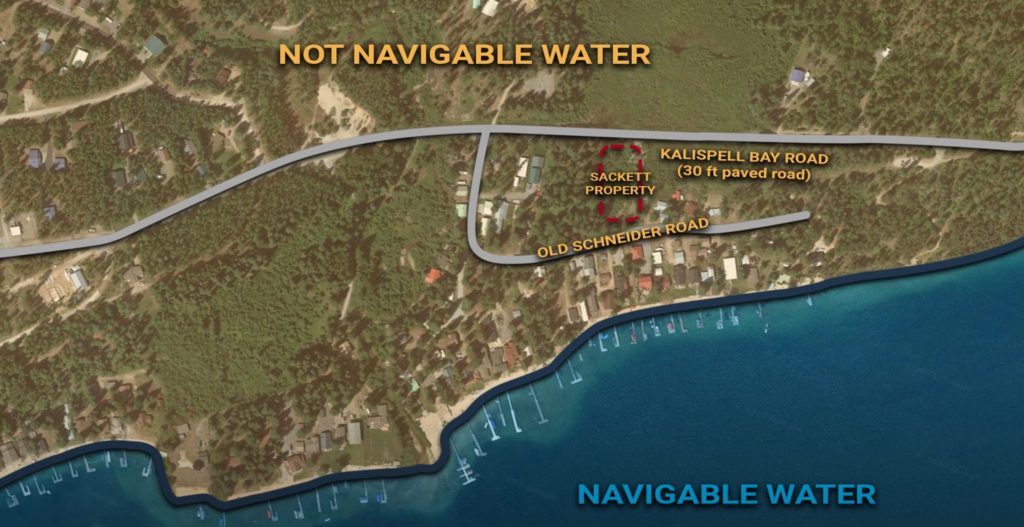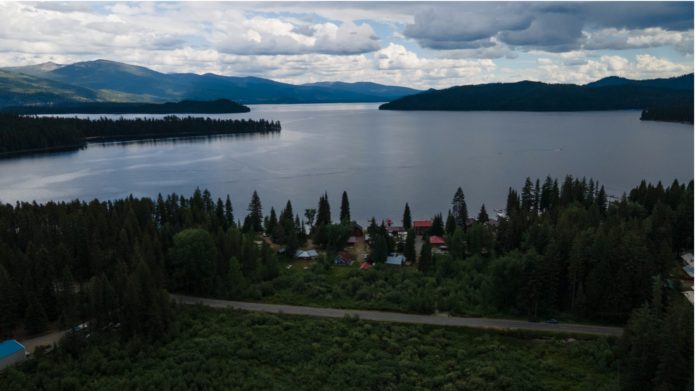The U.S. Supreme Court handed down a landmark ruling on Thursday that significantly curtails the ability of the Environmental Protection Agency to expand its authority over private property under the Clean Water Act.
The case, Sackett v. EPA, centered around property owners Mike and Chantell Sackett’s battle against the agency’s claim that their land near Priest Lake in Idaho fell under the jurisdiction of “Waters of the United States,” effectively designating the federal government as the de facto owner.
The Sacketts’ legal ordeal began 15 years ago when they started construction on their home site, only to be met with a stop-work order from the EPA. The agency argued that their property is classified as wetland and fed into a non-navigable creek, which eventually flowed into Priest Lake. That made it a “Waters of the United States” jurisdiction.
The lot that the Sackett own is surrounded by others that have been developed into a residential neighborhood. Only theirs was singled out by the EPA.
The U.S. Court of Appeals for the 9th Circuit had previously ruled in favor of the EPA, but after months of deliberation, the Supreme Court reversed the decision, narrowing the EPA’s authority.

Writing for the majority, Justice Sam Alito emphasized the need for a clear rule regarding what constitutes wetlands and waters covered by the federal government under the “interstate commerce” clause.
The court clarified that “waters” is understood by the public to mean to permanent bodies of water, excluding temporary ponds, ditches, or puddles. Wetlands separate from traditional bodies of water are deemed non-covered, while those connected to permanent waters may still be considered “waters of the United States.” For example, marshes adjacent to lakes or flowing waters, with a continuous surface connection, may fall under federal jurisdiction.
The ruling carries significant implications for property owners nationwide, as it protects them from potential “severe criminal sanctions for even negligent violations” of the Clean Water Act.
Justice Clarence Thomas, in a concurring opinion joined by Justice Neil Gorsuch, argued that the :curbs a serious expansion of federal authority that has simultaneously degraded States’ authority and diverted the Federal Government from its important role as guarantor of the Nation’s great commercial highways into something resembling ‘a local zoning board.’”
Four justices — Sonia Sotomayor, Elena Kagan, Brett Kavanaugh, and Ketanji Brown Jackson — agreed the Sacketts’ property is not covered by the Clean Water Act but disagreed with the majority’s reasoning.
Justice Kavanaugh, who wrote the dissenting opinion for the four, said the narrower test established by the majority may leave some previously regulated adjacent wetlands unprotected, which could impact water quality and flood control efforts.
Damien Schiff of the Pacific Legal Foundation, who represented the Sacketts, called the ruling a victory for property owners, the rule of law, and the constitutional separation of powers.
Schiff said the decision restores the Clean Water Act to its original limits, providing clearer guidelines for federal regulators and ensuring fairness and consistency.
“The Court made the right call in limiting federal jurisdiction over wetlands and placing decision-making power back in the hands of States,” said Alaska Gov. Mike Dunleavy. “This ruling stands to promote the kind of responsible development my Administration is working to bring to Alaska.”
“The State of Alaska has long advocated for limiting the expansion of the definition of WOTUS. Alaska argued to the Supreme Court in a friend-of-the-court brief that an expansive WOTUS definition exceeded the authority granted to the federal agencies under the Clean Water Act. In addition, the State recently urged exemptions for unique types of wetlands such as permafrost in comments it submitted last year as part of EPA’s WOTUS rulemaking. Earlier this year, Alaska and 23 other States won a preliminary injunction of the EPA’s revised WOTUS definition,” the Office of the Governor of Alaska wrote.
Earthjustice, which filed an amicus brief to support the federal government’s position, was displeased:
“The Sackett decision undoes a half-century of progress generated by the Clean Water Act. More than 118 million acres of formerly protected wetlands now face an existential threat from polluters and developers,” said Sam Sankar, senior vice president of Programs at Earthjustice.
“This decision is the culmination of industry’s decades-long push to get conservative courts to do what Congress refused to do. The Court’s decision to deregulate wetlands will hurt everyone living in the United States. Earthjustice will continue to fight to protect our waters to ensure the health of communities and ecosystems for decades to come,” Sanker said.

The question now is. Will the EPA adhered to the ruling, or will they just ignore it like NPS did with the Sturgeon discissions X2?
They will find another way because they hate to lose.
Good. But enforce it?
After reading the Supreme courts ruling and summarization, the EPA and ACE decisions will have no effect on their denial of federal permits necessary for the foreign owned pebble prospects proposed plan 😉
You’re right. Pebble figured prominently in the Sackett Opinion. (/sarc). Cheers –
3rd Generation, …Foreign-owned entities supply 90% of everything in every hardware store in our nation. We should be demanding foreign entities mine the raw materials here to help balance the trade deficit.
9-0 decision just like I said back in September of last year and a number of other articles on the subject. ‘https://mustreadalaska.com/idaho-property-owners-v-epa-will-be-first-case-heard-by-supreme-court-when-new-season-starts-on-monday/#comments’
5-4
9-0 in favor of the Sacketts. 5-4 in the new definition of the word “navigable.” Once again, your reading comprehension (or lack thereof) is showing. Cheers –
It was a 9-0 ruling. The Justices split 5-4 in their opinion of how to define what bodies of water the EPA has authority over.
How glorious!
“This decision is the culmination of industry’s decades-long push to get conservative courts to do what Congress refused to do. …”
Completely inverted reasoning, as is typical. This ruling returns the CWA to within the bounds of Congress’ intent as necessarily bounded by the limits imposed by the Constitution. The bureaucratic creep was activists and authoritarians attempting to go beyond what Congress intended using unConstitutional and undemocratic methods.
Good point Matthew. Refreshing.
How about that frat boy?? Strange bedfellows, indeed.
Big government needs to be reigned in.
I BELIEVE the waters have to be a certain size at least 20 acres to be exact to become waters of the United States. So IF (wet)lands were donated to the new state of AK in 1959 and lo and behold, drainage was impaired by oh say a quasi government Alaskan corporate entity going faster and heavier in the (wet)land(s) and a pond measurably “grew” as evidenced by aerial photographs the now 20 acre lake ten feet deep all year round now belongs again to…? THE FEDS! And all the stupid people and their transient kings said “YAY”. LOOK WHAT WE CAN DO.
Government should be forced to pony-up the legal fees AND also the difference in construction material cost from 15 years ago.
Don’t tell me the Alaska Legal Department can’t figure this out. Time for a new AG Opinion. Ok?
So can the State of Alaska issue a permit to build in the waters of the United States? YES? How so? Prove it fellers.
They didn’t read their Louis L’Amour. And picked a fight with Sacketts. Bad choice!!,
That’s actually very good Chuck. In fact, I think L’Amour penned one entitled, “Sackett’s Land.”
Comments are closed.